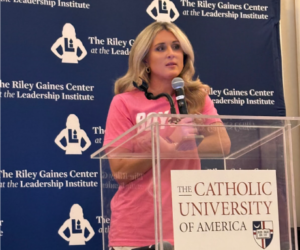Immaculee Ilibagiza Speaks on Love and Forgiveness

Photo Courtesy of Speaking.com
By Renee Rasmussen
Immaculee Ilibagiza, a survivor of the Rwandan genocide, came to Catholic University to speak to the students for Campus Ministry’s CUA on Tap presentation on Thursday February 13. Her talk, focused on the power of forgiveness and healing, followed her journey through the genocide.
Ilibagiza grew up in a small village in Rwanda,with her parents and three younger brothers. She attended the National University of Rwanda where she studied electrical and mechanical engineering. When she came home for Easter break, the president was assassinated after his plane was shot down causing the genocide to begin on April 6th, 1994. Ilibagiza’s father sent her to a neighboring pastor’s house where she and seven other women hid in a 3 by 4 bathroom to avoid getting raped and murdered.
Looking back on her experience, she told the crowd she learned two main lessons: how to love and how to forgive.
“Everything comes back to love,” said Ilibagiza. She said when she was trying to understand why the genocide occurred, she asked herself what Rwanda could’ve done, and what they failed to do.
“The only answer I could come with that really made sense was we failed to love one another. That’s what caused the genocide,” Ilibagiza said.
Ilibagiza began telling the audience about her time in hiding. For 91 days she and eight other women were able to hide in the pastor’s small bathroom. The man told his children that he lost the key to the bathroom so they wouldn’t be suspicious. Ilibagiza and the girls were fed from the children’s leftovers that the man fished out of the trash. It was here, in this small bathroom, where Ilibagiza learned of God’s existence and the power of the rosary.
Although Ilibagiza grew up in a Catholic household, an experience while in hiding confirmed the existence of God for her. During the genocide, members of the Hutu ethnic majority were searching houses looking for members of the Tutsi minority in hiding. When they came and searched the pastor’s house, Ilibagiza prayed and asked God for the soldiers to not open the bathroom door. After her prayer, she fainted and woke up five hours later to the pastor opening the door.
He told the women that the men searched the whole house, even looking in suitcases for hiding babies, but when a man came to the bathroom he told the pastor, “You know what, we trust you. You are a good man. There’s no one here,” and then left.
Ilibagiza’s said her first thought was not that she was saved but that God was real. She was amazed that God was able to hear her in this small bathroom. It was then she began to read the bible and pray the rosary.
When she prayed her first rosary, Ilibagiza said it was the first time in the bathroom she had felt peace. So she continued to say the rosary all day. That day, and every day from then on in the bathroom, she prayed 27 rosaries and 40 Divine Mercy Chaplets.
“And I used to complain about saying one rosary a day,” Ilibagiza said.
While praying the rosary and mediating on the fifth sorrowful mystery, the crucifixion, Ilibagiza was able to understand forgiveness. She told the audience that through prayer, God was able to teach her about true love and how to love her enemies. In the bathroom she began to think of role models who believed in love.
She asked herself, “who do you want to be, Hilter or Mother Teresa?”
When she was finally able to leave the bathroom, Ilibagiza learned her whole family in Rwanda had been murdered. In her despair she heard God tell her, “The journey of your loved ones is over here on Earth, but not in Heaven.”
Ilibagiza decided at that moment she had the power to choose how she would live her life. Even if she didn’t know how much longer she would have, her journey was just beginning, and she didn’t want to choose to hate.
When praying she once again heard God’s voice encourage her to choose love, “If you choose love, if you choose goodness, I am with you.”
Catered by Nando’s Peri-Peri , this event was packed with students. Before the talk, students got their portion of chicken wings, mashed potatoes and peas, and sat down to chat and listen to the The Jazz Rats, a student band. Overall students seemed to be enjoying CUA Tap, and were excited to hear Ilibagiza’s story.







